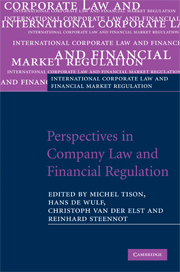Book contents
- Frontmatter
- Contents
- List of contributors
- Foreword
- PART I Perspectives in company law, SECTION 1: European company law: regulatory competition and free movement of companies
- PART 1 Perspectives in company law, SECTION 2: Corporate governance, shareholders' rights and auditing
- 9 Stakeholders and the legal theory of the corporation
- 10 The renaissance of organized shareholder representation in Europe
- 11 In search of a middle ground between the perceived excesses of US-style class actions and the generally ineffective collective action procedures in Europe
- 12 Some modest proposals to provide viable damages remedies for French investors
- 13 Pre-clearance in European accounting law – the right step?
- 14 International standards on auditing and their adoption in the EU: legal aspects and unsettled questions
- 15 Corporate governance: directors' duties, financial reporting and liability – remarks from a German perspective
- 16 Some aspects of capital maintenance law in the UK
- 17 Luxembourg company law – a total overhaul
- 18 Role of corporate governance reform and enforcement in the Netherlands
- PART 1 Perspectives in company law, SECTION 3: Takeover law
- PART II Perspectives in financial regulation, SECTION 1: European perspectives
- PART 2 Perspectives in financial regulation, SECTION 2: Transatlantic perspectives
- PART III Miscellaneous
- Index
- References
13 - Pre-clearance in European accounting law – the right step?
from PART 1 - Perspectives in company law, SECTION 2: Corporate governance, shareholders' rights and auditing
Published online by Cambridge University Press: 04 August 2010
- Frontmatter
- Contents
- List of contributors
- Foreword
- PART I Perspectives in company law, SECTION 1: European company law: regulatory competition and free movement of companies
- PART 1 Perspectives in company law, SECTION 2: Corporate governance, shareholders' rights and auditing
- 9 Stakeholders and the legal theory of the corporation
- 10 The renaissance of organized shareholder representation in Europe
- 11 In search of a middle ground between the perceived excesses of US-style class actions and the generally ineffective collective action procedures in Europe
- 12 Some modest proposals to provide viable damages remedies for French investors
- 13 Pre-clearance in European accounting law – the right step?
- 14 International standards on auditing and their adoption in the EU: legal aspects and unsettled questions
- 15 Corporate governance: directors' duties, financial reporting and liability – remarks from a German perspective
- 16 Some aspects of capital maintenance law in the UK
- 17 Luxembourg company law – a total overhaul
- 18 Role of corporate governance reform and enforcement in the Netherlands
- PART 1 Perspectives in company law, SECTION 3: Takeover law
- PART II Perspectives in financial regulation, SECTION 1: European perspectives
- PART 2 Perspectives in financial regulation, SECTION 2: Transatlantic perspectives
- PART III Miscellaneous
- Index
- References
Summary
The ‘open society’ of accounting law actors
The responsibility for the accuracy and reliability of the annual and consolidated acounts of a company has for a long time rested with the members of the board of directors (in some countries also with the members of the supervisory board) and with the auditors who are educated and mandated to scrutinize the financial reports drawn up by the company itself and to testify as to its accordance with the relevant rules and principles under accounting law. This responsibility has been strengthened in recent European legislation. On the one hand, the establishment of an ‘audit committee’ being part of the company board is held to be necessary for ‘public-interest entities’ such as listed companies; on the other hand, the standards of auditing for public accountants have been increased by a recently enacted directive, including new levels of public oversight devoted to their work.
Nevertheless, there are additional actors present in the world of accounting. First of all, there are the standard setters as such. In the old days, these used to be national legislators or other national bodies; over time, starting with the directive on annual accounts in 1978, the European Institutions joined this group. Accounting rules were codified during the 1980s in most European countries. This ‘legalization’ of accounting practice led to an increased scrutiny by the courts.
- Type
- Chapter
- Information
- Perspectives in Company Law and Financial Regulation , pp. 231 - 243Publisher: Cambridge University PressPrint publication year: 2009



